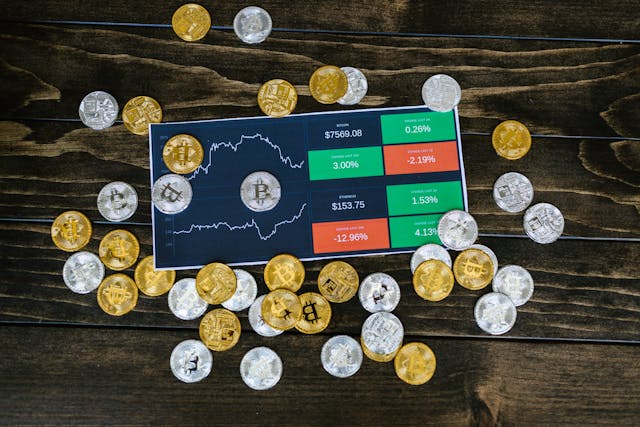Exploring the Landscape of Altcoins
What Are Altcoins?
The Birth of Altcoins
Altcoins, short for “alternative coins,” are cryptocurrencies other than Bitcoin. While Bitcoin paved the way for digital currencies, altcoins emerged as alternatives with different features and use cases. These coins exist in the same decentralized, blockchain-based environment, but each offers something unique in terms of technology, goals, and investment potential.
Types of Altcoins
There are several types of altcoins, each with its own niche:
-
Tokens: These are typically used for specific platforms or ecosystems (e.g., Ethereum’s ERC-20 tokens).
-
Stablecoins: These coins are pegged to traditional assets like the US Dollar (e.g., Tether and USD Coin), offering stability in the volatile crypto market.
-
Privacy Coins: Coins like Monero (XMR) and Zcash (ZEC) prioritize privacy and anonymity.
-
Forks of Bitcoin: Some altcoins are created by forking Bitcoin’s blockchain and making adjustments (e.g., Litecoin).
How Altcoins Differ from Bitcoin
While Bitcoin remains the most widely recognized cryptocurrency, altcoins often serve different purposes. Bitcoin is a store of value and a digital alternative to gold, but altcoins may offer faster transaction speeds, privacy features, or specialized use cases like smart contracts (Ethereum) or decentralized applications (DApps). Bitcoin also runs on its own proof-of-work consensus mechanism, whereas many altcoins, like Cardano, use proof-of-stake, which is considered more energy-efficient.
The Importance of Altcoins in the Crypto Space
Diversifying the Crypto Market
Altcoins play a crucial role in diversifying the cryptocurrency market, giving investors options beyond Bitcoin. While Bitcoin continues to dominate, altcoins provide opportunities for diversification, which can lower risks for investors and bring innovation to the sector.
Innovations Brought by Altcoins
Many altcoins introduce cutting-edge technologies, such as Ethereum’s smart contracts, which allow for programmable transactions without intermediaries. These innovations are pushing the boundaries of blockchain technology and helping shape the future of finance, business, and even social systems.
Altcoins and Their Role in the Future of Finance
Altcoins are at the forefront of the decentralized finance (DeFi) revolution. By providing new mechanisms for lending, borrowing, trading, and investing, altcoins are transforming how financial services operate. For instance, Ethereum, Solana, and Cardano are creating platforms that facilitate decentralized applications (DApps) and decentralized exchanges (DEXs), allowing people to engage with financial systems without centralized banks.
Popular Altcoins to Watch
Ethereum (ETH)
Ethereum is perhaps the most popular altcoin, second only to Bitcoin. It is known for its smart contract capabilities, which allow developers to build decentralized applications (DApps) on its blockchain. Ethereum is also transitioning to Ethereum 2.0, which will improve scalability and energy efficiency.
Binance Coin (BNB)
Binance Coin was initially launched as a utility token for the Binance exchange, but it has since evolved into a full-fledged cryptocurrency used for various purposes, including transaction fees, staking, and more. Binance Coin has gained significant popularity due to the success of the Binance platform.
Cardano (ADA)
Cardano is a blockchain platform focused on sustainability, scalability, and interoperability. It uses a proof-of-stake mechanism and has made significant strides in providing a secure and energy-efficient alternative to other cryptocurrencies.
Solana (SOL)
Solana is a fast, scalable blockchain designed for decentralized applications and cryptocurrency transactions. It is known for its high throughput and low transaction fees, making it an attractive alternative to Ethereum.
Ripple (XRP)
Ripple is both a digital currency (XRP) and a payment network aimed at improving the speed and cost-effectiveness of cross-border transactions. It is used by financial institutions and remittance services for fast, low-cost payments.
How to Choose the Right Altcoin for Investment
Conducting Research and Due Diligence
Before investing in any altcoin, it’s crucial to conduct thorough research. Look into the coin’s whitepaper, technology, team, and community support. The more information you have, the better decision you can make.
Market Capitalization and Trading Volume
The market capitalization and trading volume of a cryptocurrency can help you assess its stability and liquidity. High market cap coins are generally considered more stable, while lower-cap coins may have more growth potential but come with higher risk.
Technology and Use Cases of the Coin
Consider the technology behind the altcoin and its practical use cases. A coin with a strong technical foundation and real-world applications is more likely to succeed long-term. For example, Ethereum’s use of smart contracts has made it a foundational piece of the DeFi ecosystem.
Risks and Rewards of Investing in Altcoins
Market Volatility
Altcoins are notoriously volatile. Prices can fluctuate dramatically due to market sentiment, technological developments, regulatory news, or broader economic events. While volatility can offer high returns, it can also lead to significant losses.
Regulatory Concerns
The regulatory landscape surrounding cryptocurrencies remains uncertain. Governments around the world are working on establishing laws for cryptocurrencies, which can have a direct impact on the value and adoption of altcoins.
The Potential for High Returns
Despite the risks, altcoins have the potential for high returns, especially those with strong development teams, unique technology, and solid use cases. Investors who get in early on promising projects can see substantial gains, but this also comes with the risk of losing their investment if the project fails.
The Future of Altcoins
The Rise of DeFi (Decentralized Finance)
DeFi has been a game-changer in the world of cryptocurrencies, and many altcoins are at the forefront of this movement. By enabling decentralized financial services, such as lending, borrowing, and yield farming, DeFi platforms are creating new ways for people to manage their money without relying on traditional financial institutions.
Altcoins and Blockchain Innovations
Altcoins will continue to drive innovation in blockchain technology. New consensus mechanisms, scalability solutions, and interoperability features will be key areas of development. Coins like Polkadot and Cosmos are focused on cross-chain interoperability, allowing different blockchains to communicate with each other.
What’s Next for Altcoins in the Crypto Space?
As blockchain technology matures, we can expect more institutional adoption of altcoins. Governments may develop their own central bank digital currencies (CBDCs), but the continued development of decentralized altcoins will offer alternatives to traditional financial systems.
Conclusion
Altcoins have transformed the cryptocurrency landscape by offering a variety of innovations, use cases, and investment opportunities. While investing in altcoins can be rewarding, it also comes with risks, especially given the volatility and regulatory uncertainties. As the crypto space continues to evolve, altcoins will likely play an even more prominent role in reshaping the future of finance and technology.
FAQs
1. What is the most popular altcoin?
Ethereum (ETH) is widely considered the most popular and successful altcoin due to its smart contract capabilities and active developer community.
2. Can altcoins replace Bitcoin?
While Bitcoin remains the leader in the cryptocurrency market, altcoins offer unique features and use cases that may eventually complement or challenge Bitcoin’s dominance, especially in areas like decentralized finance (DeFi).
3. How do I choose the best altcoin to invest in?
Conduct thorough research, analyze the technology behind the coin, consider the team and community support, and check its market capitalization and trading volume before investing in an altcoin.
4. Are altcoins a good investment?
Altcoins can offer high returns but are also more volatile and risky than Bitcoin. Carefully consider the risks before investing in any altcoin.
5. What is the future of altcoins?
The future of altcoins is promising, with ongoing innovation in blockchain technology, decentralized finance, and other areas. As the ecosystem matures, altcoins may continue to grow in importance.
Please don’t forget to leave a review.


